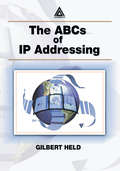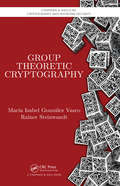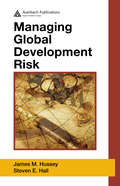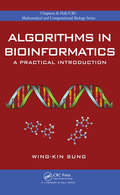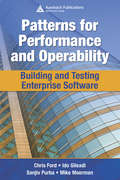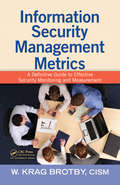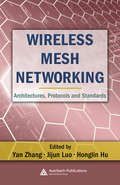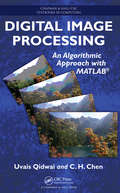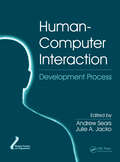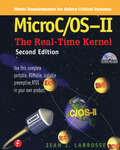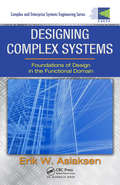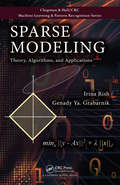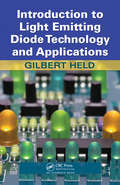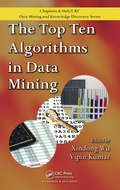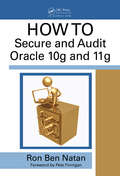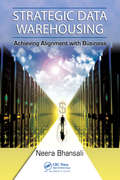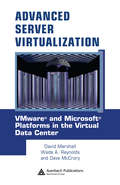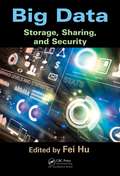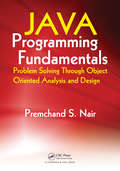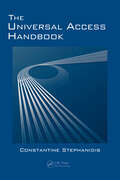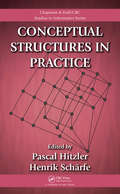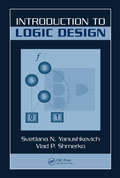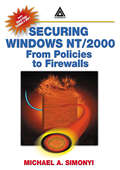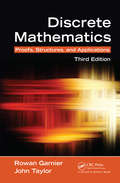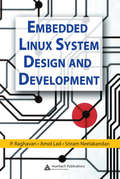- Table View
- List View
The ABCs of IP Addressing
by Gilbert HeldOur world is rapidly becoming an Internet-based world, with tens of millions of homes, millions of businesses, and within a short period of time, possibly hundreds of millions of mobile professionals accessing the literal mother of all networks. One of the key problems affecting many Internet users, ranging from individual professionals to networki
Group Theoretic Cryptography (Chapman & Hall/CRC Cryptography and Network Security Series)
by Maria Isabel Gonzalez Vasco Rainer SteinwandtGroup theory appears to be a promising source of hard computational problems for deploying new cryptographic constructions. This reference focuses on the specifics of using groups, including in particular non-Abelian groups, in the field of cryptography. It provides an introduction to cryptography with emphasis on the group theoretic perspective, making it one of the first books to use this approach. The authors provide the needed cryptographic and group theoretic concepts, full proofs of essential theorems, and formal security evaluations of the cryptographic schemes presented. They also provide references for further reading and exercises at the end of each chapter.
Managing Global Development Risk
by Steven E. Hall James M. HusseyWhile global sourcing has expanded dramatically in terms of activities, consistent challenges remain for organizations that choose such a business decision. These challenges include maximizing the opportunity afforded by globalization, fully realizing potential gains, and managing the risks inherent to global development. In addition, while companies continue to start or expand their use of global resources, little is being done to help project managers, business analysts, architects, and others succeed in this new environment. Built upon real-world experiences, Managing Global Development Risk provides the tools, techniques, and knowledge necessary to achieve project success with offshore resources. By reading and utilizing the templates within this book, you will acquire: Knowledge of project management principles and their application, Understanding of software development processes and their application , Insight into the diverse personalities within your global development team and the appropriate management and communications style to achieve success. Awareness of cultural issues and mannerisms that will enhance your ability to guide your team To fully realize the benefits of global development, a proper mix of local and offshore resources is essential. This book is an important tool that can help you gain the necessary competency and expand your skills in this critical area.
Algorithms in Bioinformatics: A Practical Introduction (Chapman & Hall/CRC Computational Biology Series)
by Wing-Kin SungThoroughly Describes Biological Applications, Computational Problems, and Various Algorithmic Solutions Developed from the author's own teaching material, Algorithms in Bioinformatics: A Practical Introduction provides an in-depth introduction to the algorithmic techniques applied in bioinformatics. For each topic, the author clearly details the bi
Patterns for Performance and Operability: Building and Testing Enterprise Software
by Chris Ford Ido Gileadi Sanjiv Purba Mike MoermanApplications that work perfectly in controlled settings often fail in production environments, impacting business operations. This book explores a frequently overlooked aspect of software development: non-functional design and testing. In the real world, hostile production conditions and changing business usage can lead to unforeseen downtime or unacceptable system performance. Written by technologists and based on real field experience, the book examines common failure scenarios, defensive design patterns, and effective performance strategies.
Information Security Management Metrics: A Definitive Guide to Effective Security Monitoring and Measurement
by CISM, W. BrotbySpectacular security failures continue to dominate the headlines despite huge increases in security budgets and ever-more draconian regulations. The 20/20 hindsight of audits is no longer an effective solution to security weaknesses, and the necessity for real-time strategic metrics has never been more critical. Information Security Management Metr
Wireless Mesh Networking: Architectures, Protocols and Standards (Wireless Networks and Mobile Communications)
by Yan Zhang Honglin Hu Jijun LuoA promising new technology, wireless mesh networks are playing an increasingly important role in the future generations of wireless mobile networks. Characterized by dynamic self-organization, self-configuration, and self-healing to enable quick deployment, easy maintenance, low cost, high scalability, and reliable services, this technology is beco
Digital Image Processing: An Algorithmic Approach with MATLAB (Chapman & Hall/CRC Textbooks in Computing)
by Uvais Qidwai C.H. ChenAvoiding heavy mathematics and lengthy programming details, Digital Image Processing: An Algorithmic Approach with MATLAB presents an easy methodology for learning the fundamentals of image processing. The book applies the algorithms using MATLAB, without bogging down students with syntactical and debugging issues.One chapter can typically be compl
Human-Computer Interaction: Development Process (Human Factors and Ergonomics)
by Julie A. Jacko Andrew SearsHailed on first publication as a compendium of foundational principles and cutting-edge research, The Human-Computer Interaction Handbook has become the gold standard reference in this field. Derived from select chapters of this groundbreaking resource, Human-Computer Interaction: The Development Practice addresses requirements specification, desig
MicroC/OS-II: The Real Time Kernel
by Jean LabrosseMicroC/OS II Second Edition describes the design and implementation of the MicroC/OS-II real-time operating system (RTOS). In addition to its value as a reference to the kernel, it is an extremely detailed and highly readable design study particularly useful to the embedded systems student. While documenting the design and implementation of the kernel, the book also walks the reader through the many related development issues: how to adapt the kernel for a new microprocessor, how to install the kernel, and how to structure the applications that run on the kernel. This edition features documentation for several important new features of the software, including new real-time services, floating points, and coding conventions. The accompanying downloadable resources include complete code for the MicroC/OS-II kernel.
Designing Complex Systems: Foundations of Design in the Functional Domain (Complex and Enterprise Systems Engineering)
by Erik W. AslaksenWithout standardized construction elements such as nuts, bolts, bearings, beams, resistors and the like, the design of physical equipment is hopelessly inefficient, and engineers are continually bogged down with re-designing these elements over and over again. Emphasizing a top-down approach, this volume considers the purpose and basic features of design and how the concept of value can provide a quantitative measure of that wider interaction of the engineered object with its environment. This work also develops the domain in which functional design takes place and explores how the system concept can be embedded in that domain. It proposes a number of functional design elements and develops them in considerable detail, outlining how they can be applied as part of a coherent design framework. For greater understanding of the discussed concepts, numerous examples and analogies are included.
Sparse Modeling: Theory, Algorithms, and Applications (Chapman & Hall/CRC Machine Learning & Pattern Recognition)
by Irina Rish Genady GrabarnikSparse models are particularly useful in scientific applications, such as biomarker discovery in genetic or neuroimaging data, where the interpretability of a predictive model is essential. Sparsity can also dramatically improve the cost efficiency of signal processing.Sparse Modeling: Theory, Algorithms, and Applications provides an introduction t
Introduction to Light Emitting Diode Technology and Applications
by Gilbert HeldRecent improvements in LED technology have made them as ubiquitous as cell phones. In fact, LEDs light up almost all cell phones screens. The technology's myriad applications and low energy use have made it nearly impossible to get through daily chores without coming in contact with LEDs. Probable advances include increased ability of the technology to support more efficient lighting and enhanced communications. With balanced coverage of the basics and future developments, Introduction to Light Emitting Diode Technology and Applications takes you on a tour of the LED evolution. The book begins with a brief history of the effort to enable the device that generates light through modern organic LEDs and reviews the fundamentals and principles of light prior to a detailed explanation of how LEDs generate different colors. After forming this basic foundation, the book examines the key LEDs in lighting and communications. It then discusses the latest opportunities and advancements in high brightness (HB) LED technology, solid state lighting, and handheld electronic applications.As we approach a new decade the role of LEDs is literally set to explode, with organic light emitting diodes emerging as a leading next generation technology for electronic displays and lighting. Challenges still exist, including light extraction, luminosity, and white light generation, not to mention non-technical obstacles such as IP disputes and the lack of standards. This book provides a foundation for resolving these issues and developing new applications for LEDs in the promising general illumination market.
The Top Ten Algorithms in Data Mining (Chapman & Hall/CRC Data Mining and Knowledge Discovery Series)
by Vipin Kumar Xindong WuIdentifying some of the most influential algorithms that are widely used in the data mining community, The Top Ten Algorithms in Data Mining provides a description of each algorithm, discusses its impact, and reviews current and future research. Thoroughly evaluated by independent reviewers, each chapter focuses on a particular algorithm and is wri
HOWTO Secure and Audit Oracle 10g and 11g
by Ron Ben-NatanThis guide demonstrates how to secure sensitive data and comply with internal and external audit regulations using Oracle 10g and 11g. It provides the hands-on guidance required to understand the complex options provided by Oracle and the know-how to choose the best option for a particular case. The book presents specific sequences of actions that should be taken to enable, configure, or administer security-related features. It includes best practices in securing Oracle and on Oracle security options and products. By providing specific instructions and examples this book bridges the gap between the individuals who install and configure a security feature and those who secure and audit it.
Strategic Data Warehousing: Achieving Alignment with Business
by Neera BhansaliOrganization of data warehouses are vital but often ignored aspects of growing enterprises. This work merges technological know-how with managerial practices to show both the business manager and the IT professional how better alignment between data warehouse plans and business strategies can lead to a successful data warehouse adoption that will support the entire infrastructure. More complete than any other text in the field, this resource also addresses the managerial and strategic aspects of data warehouses, offering doable solutions that will allow for the strategic alignment of these warehouses while building them and ensuring that this alignment is sustained.
Advanced Server Virtualization: VMware and Microsoft Platforms in the Virtual Data Center
by David Marshall Wade A. Reynolds Dave McCroryPresenting practical guidelines and examples, Advanced Server Virtualization emphasizes design, implementation, and management from both a technical and consultative point of view. It features step-by-step guidelines for planning, deployment, installing, configuring, and creating virtual servers. Covering Microsoft Virtual Server and VMware, it addresses platform-specific virtualization features such as virtual machines, hard drives, networking, and resource management. It offers best practices that allow users to avoid common pitfalls and achieve success faster during server virtualization implementations. It also discusses software licensing issues and the cost-benefits of deploying virtual servers.
Big Data: Storage, Sharing, and Security
by Fei HuAlthough there are already some books published on Big Data, most of them only cover basic concepts and society impacts and ignore the internal implementation details-making them unsuitable to R&D people. To fill such a need, Big Data: Storage, Sharing, and Security examines Big Data management from an R&D perspective. It covers the 3S desi
Java Programming Fundamentals: Problem Solving Through Object Oriented Analysis and Design
by Premchand S. NairWhile Java texts are plentiful, it's difficult to find one that takes a real-world approach, and encourages novice programmers to build on their Java skills through practical exercise. Written by an expert with 19 experience teaching computer programming, Java Programming Fundamentals presents object-oriented programming by employing examples taken
The Universal Access Handbook (Human Factors and Ergonomics)
by Constantine StephanidisIn recent years, the field of Universal Access has made significant progress in consolidating theoretical approaches, scientific methods and technologies, as well as in exploring new application domains. Increasingly, professionals in this rapidly maturing area require a comprehensive and multidisciplinary resource that addresses current principles
Conceptual Structures in Practice (Chapman & Hall/CRC Studies in Informatics Series)
by Pascal Hitzler Henrik SchärfeExploring fundamental research questions, Conceptual Structures in Practice takes you through the basic yet nontrivial task of establishing conceptual relations as the foundation for research in knowledge representation and knowledge mining. It includes contributions from leading researchers in both the conceptual graph and formal concept analysis
Introduction to Logic Design
by Svetlana N. Yanushkevich Vlad P. ShmerkoWith an abundance of insightful examples, problems, and computer experiments, Introduction to Logic Design provides a balanced, easy-to-read treatment of the fundamental theory of logic functions and applications to the design of digital devices and systems. Requiring no prior knowledge of electrical circuits or electronics, it supplies the
Securing Windows NT/2000: From Policies to Firewalls
by Michael A. SimonyiIn today's business environment it is no longer safe to conduct any business on the Internet without first protecting it. Small, medium, and large corporations require a massive dose of security to protect themselves and their digital assets from unwanted intruders. A managerial guide and practical technical tutorial, Securing Windows NT/2000: From
Discrete Mathematics: Proofs, Structures and Applications, Third Edition
by John Taylor Rowan GarnierTaking an approach to the subject that is suitable for a broad readership, Discrete Mathematics: Proofs, Structures, and Applications, Third Edition provides a rigorous yet accessible exposition of discrete mathematics, including the core mathematical foundation of computer science. The approach is comprehensive yet maintains an easy-to-follow prog
Embedded Linux System Design and Development
by P. Raghavan Amol Lad Sriram NeelakandanBased upon the authors' experience in designing and deploying an embedded Linux system with a variety of applications, Embedded Linux System Design and Development contains a full embedded Linux system development roadmap for systems architects and software programmers. Explaining the issues that arise out of the use of Linux in embedded systems, the book facilitates movement to embedded Linux from traditional real-time operating systems, and describes the system design model containing embedded Linux.This book delivers practical solutions for writing, debugging, and profiling applications and drivers in embedded Linux, and for understanding Linux BSP architecture. It enables you to understand: various drivers such as serial, I2C and USB gadgets; uClinux architecture and its programming model; and the embedded Linux graphics subsystem. The text also promotes learning of methods to reduce system boot time, optimize memory and storage, and find memory leaks and corruption in applications.This volume benefits IT managers in planning to choose an embedded Linux distribution and in creating a roadmap for OS transition. It also describes the application of the Linux licensing model in commercial products.
